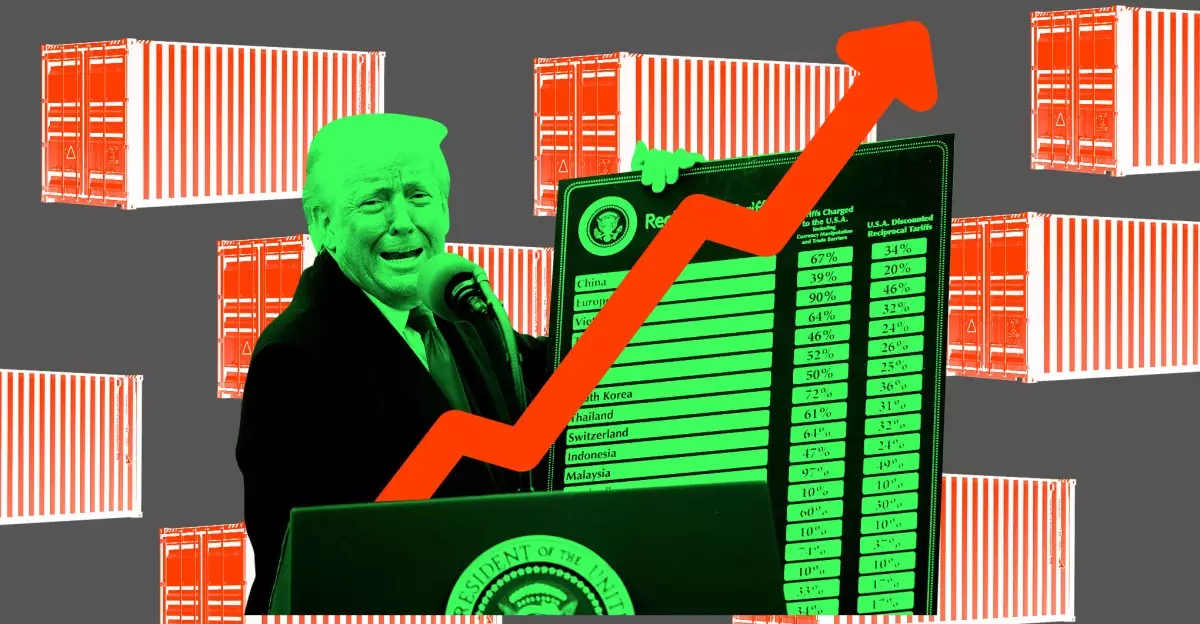In a striking reversal of fortunes, the tech industry, which once viewed the political landscape as favorable under the Trump administration, now finds itself ensnared in a web of tariffs and international ire. The U.S. government, under President Trump’s ambiguous trade policies, is no longer considered a reliable ally for technology giants like Meta, Apple, and Tesla. Instead, these corporations are grappling with the repercussions of the administration’s aggressive stances, not only focusing on domestic markets but also navigating the intricacies of international diplomacy and economic policies.
Ursula von der Leyen, President of the European Commission, has recently suggested implementing a levy on the advertising revenues of digital services, should tariff negotiations with the U.S. stall. This development is alarming for tech leaders. Where they once anticipated that Trump’s administration would navigate talks deftly and favorably, they are now left wading through rising tensions that threaten their bottom lines and operational stability.
Complications for Big Tech Leaders
The situation is further exacerbated for tech behemoths like Meta. The company’s executives had ardently supported Trump, hoping his administration would mitigate the pressure from the European Union’s rigorous regulations. Instead, the impending fines due to violations of the EU’s Digital Markets Act represent a significant self-inflicted wound for these companies. Notably, Meta isn’t celebrating just yet; the backlash has raised questions about its operational viability across international borders, as the company faces heightened scrutiny and potential penalties.
Elon Musk, the mastermind behind Tesla and SpaceX, is not immune to these complications either. The duality of Musk’s relationship with Trump has led to increasingly polarized public sentiment. Once a beloved figure, Musk’s approval ratings have dropped as his support for Trump surged. This has directly impacted Tesla’s stock, which has plunged by more than 30% this year. Compounding matters, Tesla has also had to discontinue the sale of its U.S.-manufactured vehicles in China, accentuating the challenges created by the escalating tariff disputes.
The Precarious Future of TikTok
While tech giants scramble to adjust to the changing political winds, TikTok faces an existential crisis amid the charged atmosphere of U.S.-China relations. America’s administration has taken a notably hardline stance toward China, leading to tariffs that pose a direct threat to TikTok’s presence in the U.S. Moreover, the Chinese government’s stern rebuke of these tariffs highlights the impossible position that the platform’s management now occupies: navigating a labyrinth of regulations while trying to retain their foothold in a lucrative but fraught market.
For TikTok’s potential bidders, such as AppLovin, this predicament complicates any plans for acquisition. The CEO of AppLovin recently stated that the ongoing uncertainties surrounding tariffs offer little room for dialogue or progress. The broader implications of these trade disputes place TikTok in a precarious state, one that underscores how entangled social media platforms have become in geopolitical struggles.
OpenAI’s Controversy: A Non-Profit Under Scrutiny
While other tech entities grapple with tariffs and market volatility, OpenAI finds itself embroiled in an internal conflict that raises ethical questions about its operational model. The organization, originally founded as a non-profit, is now facing scrutiny over its shift toward a profit-driven structure. Critics, including former employees, assert that this transformation could undermine the very mission OpenAI was founded upon. Yet, the reality of funding and financial viability likely complicates the capacity to revert this course.
The situation raises the question: has OpenAI truly harnessed the resources of a charity for gain? While the financial stakes may encourage a deviation from its nonprofit roots, the movement against this shift is gaining a foothold. The unfolding controversy illustrates a deeper tension within the tech sector regarding corporate ethics and the balance between profit and purpose.
The Layoff Tsunami at Google
Meanwhile, layoffs across major tech entities, such as Google, further amplify the anxieties surrounding employment security in the industry. Reports of unexpected layoffs caused shockwaves among employees, highlighting the sense of instability that has seeped into the sector. Although part of a necessary realignment, the manner in which these cuts were executed raises broader questions about workforce management and corporate accountability. Tech companies such as Google must find ways to balance the pressures from market demands with the ethical responsibility they hold toward their employees.
As the technological landscape becomes increasingly tumultuous, these events reveal not just the vulnerabilities of individual companies but also signal a trend of volatility within the broader industry. The convergence of geopolitics, corporate ethics, and market performance will ultimately redefine the role of tech giants in global affairs, leaving them to navigate an uncertain future.


Leave a Reply